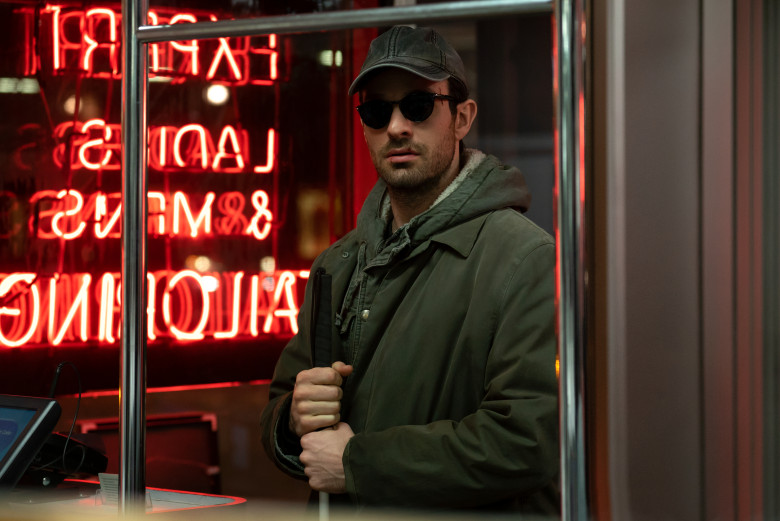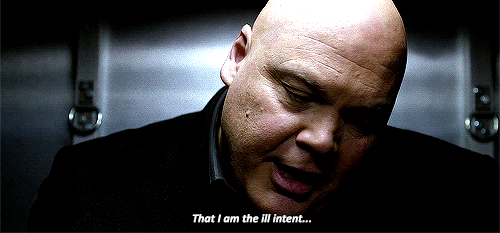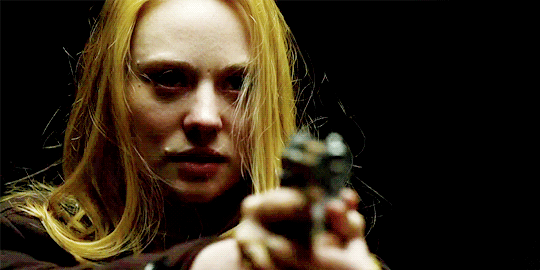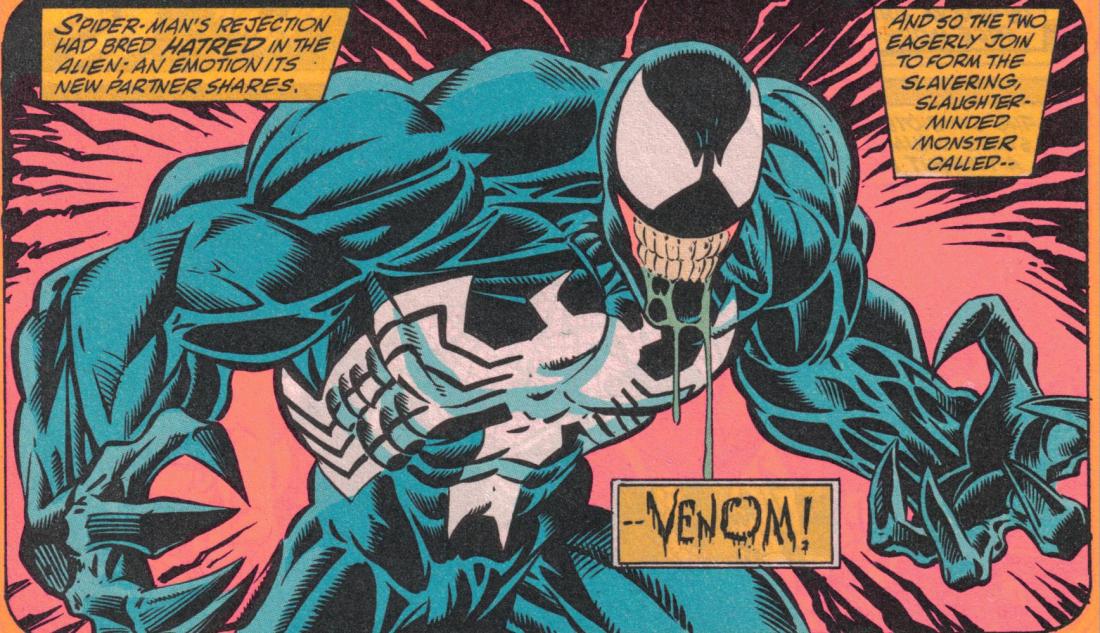There’s a moment in the middle of Frank Miller’s classic Batman run ‘The Dark Knight Returns’ (1986) that I’m struggling to find a panel to evidence. I’ll do my best to paint a picture. Batman, now in his 50s, returns to Gotham a cranky, grizzled middle-aged man. His return serves to reignite the Joker (comatose for a decade or so) and his will wreak havoc. Being the criminal genius that he is, Joker quickly and effortlessly secures his own release through the misguided efforts of a prominent psychologist. Wasting no time, he murders hundreds, many of the deaths being televised. In the hunt for the sadistic clown, Batman is forced to wrestle with his CODE of never taking a life. He wonders how many innocent people had died, and would continue to die, because of Joker’s existence, and how much of the blood was on his hands because he could not bring himself to end Joker for good– to kill him.
It was this segment that sat with me throughout season three of Marvel Netflix’s Daredevil as we see the reemergence of Wilson Fisk, now haled as The Kingpin. Pushed to his emotional limit, an already broken Matt Murdock is forced to grapple with not only the inability of the legal system to stop Fisk, but also it’s easy corruptibility. He must debate how many more will die in Fisk’s conquest for power? And how responsible is Daredevil if Fisk persists?
**Before we go any further, I want to warn you there will be MAJOR SPOILERS AHEAD. If you have not finished Daredevil season three and you don’t want to know the ending, stop reading. Okay, you’ve been warned. Let’s get into it.**

In the first act of the season, audiences are pushed to consider whether a madman like Fisk can be reformed or at least blunted by romantic love. This is juxtaposed with an unhinged Matt Murdock coping with severe physical and emotional trauma. Matt has distanced himself from his friends both super and not, and he refuses to even wear the Daredevil armor, which I get you want symbolism in your aesthetic but what he subjects his body to is difficult to watch. What remains of Matt is an unceasing determination to prevent Fisk’s rise, even at a cost of own life. For a couple episodes it even looks as though Matt/Daredevil is the actual antagonist, hell bent on ruining the life and reputation of a man who has paid (a portion of) his debt to society through time served.

Once Fisk, or the Kingpin, is revealed in the second act to be the murderous crime-lord we know and love, Matt is forced to decide what stopping him really means. He must choose between his personal moral code drawn from his deep Catholic faith, and the lives of innocents in Hell’s Kitchen.

So, let’s talk about violence. I am no expert, I have no academic background. I am history nerd and I enjoy reading political theory, but again, not an expert in any of these fields. These are just my views, opinions. Add some salt, if you will.
I believe there’s a difference between the violence of assault, say attacking an individual physically because they angered you, or got in your way, or because you wanted to lash out, and the violence of striking back against an oppressive force/organization like a government or corporation. And even in that, I’m very selective on the political violence I endorse. I get that the line is very blurry. In my short lifetime, my peers and I have seen America overtaken by acts of political violence.
There was a moment in the 1930s when heroes slayed their foes, even Batman. The ‘No Kill’ trope gained prominence in comic books in the 40s. Morality shifted during the second World War, leading to more empathetic heroes. In this, they drew the biggest distinction yet in a subculture of costumed individuals. It ceded the moral high ground to the heroes and altered the fashion in which they thwarted their prey. You couldn’t simply shoot or explode your villain anymore, and as far as I’m concerned that wasn’t a bad thing. This makes sense in that you can have reoccurring villains and the limits of force pushed writers to be more creative.

Both Daredevil and Batman live-action adaptations are perfect vehicles for this style of creativity to flourish. Neither can summon lightning, or fly, or lift a car with their bare hands. They rely on constant martial arts training, non-lethal weaponry, and an intimacy with the streets they are sworn to protect. This leads to some amazing brawls in alleys, basements, hallways, and sewers. Despite the prevalence of the extraordinary Avengers and X-Men, audiences still clamor for tales of every-men pushed their physical limits in the street-level pursuit of justice.
But what happens when the hero finally collides with a force so powerful it can’t be contained in a jail, so influential it can’t be punished, and so determined it will murder again and again? What do you do when that villain is The Kingpin and he has a major chunk of the FBI in his pocket, as well as most of the prison staff and several government officials? What do you do when no one you know is safe from Fisk’s wrath? These are the questions Matt, as well as, Karen and Foggy must grapple with in season 3.
I’ll start with Karen who we get to know much better this time around. Half an episode is dedicated to a traumatic event from her past in which she kills her brother while driving under the influence. Karen must also own up to killing James Wesley during the events of season 1. She really takes a hard look at herself and what kind of person she has been and because of this she floats morally. We see Karen lay down false threats mid-interrogation, lies which could jeopardize her career. She also goes on a solo mission to enrage the Kingpin to the point where he’ll strike her on camera. Inevitably she cools off and her faith in ‘the system’ returns which puts her at odds with Matt who sees killing as the only way to stop Kingpin. In dealing with her own past, Karen is less insistent on pushing Matt one way or another, rather she just misses his friendship and resents him for his distance.

Oh Foggy, you vanilla scoop in a sugar cone. Lacking any trauma in his past while also being a middle class, straight white guy, Foggy has 100% total confidence in ‘the system.’ Even after it’s reveal that Kingpin has a detail of FBI agents (and a few higher-ups) under his thumb, a feat he accomplished through blackmail over the span of two or three weeks, Foggy insists on caging Fisk through legal means. Even when a grand jury is convened with overwhelming testimony against Fisk, and he bends the jury to his will through threats and intimidation, Foggy STILL insists in his faith in the system. This is the same city that recently served up the death of Eric Garner for selling cigarettes on the street, the same city that instituted racist police reforms in the 90s that led to thousands of unlawful arrests of black and brown individuals. Good grief! It doesn’t make sense and yet, we are encouraged to agree with Foggy’s morality since killing Fisk would “break Matt.”

Would killing the Kingpin “break Matt” as Foggy (and Matt ultimately) believes? I’m not so convinced. Near his defeat, Fisk gets up in Matt’s ear like, “You know there’s no prison that can hold me!” He’s right. He knows it, Matt knows it, and we should all know it by now. Sitting in the audience, I count on Kingpin breaking out– more shenanigans for us. For Foggy and Matt, this has real consequences. They know with certainty that as long as Fisk lives he will continue to take lives, and freed from prison he tends to be exceptional at that. They have seen him twist his finger around the judicial system more than once. And finally, they know that as long as Kingpin lives it will endanger their loved ones– no one is safe and no one is off limits. What is one man’s code when weighed against the lives of several innocents? Is it not stubbornness to not eliminate Fisk? I can’t argue that it would not break or taint Matt in some way, but what is that pain when paired against the mourning of innocents slain in war that had no part in? How many people have to die before lethal force is not only logical, it is necessary?
We know in the end, Matt/Daredevil opts not to kill Fisk and instead hand him over to the NYPD… and organization known for its fairness and incorruptibility. Yikes. Matt decides that being Matt (and not a full-time Daredevil) ain’t so bad and in the end we see the reformation of Nelson, Murdock & Page.
Conclusion:
I really enjoyed this season. Daredevil never ceases to impress me with meticulous and creative choreography, great acting, and well flesh out characters. I’m so tired of the ‘no kill’ trope though. I’m tired of being told that if a hero kills a mass murderer like Wilson Fisk, they are morally broken. This is repressive bourgeois morality and it’s impressed upon audiences. It serves to prevent any serious harm from coming to the powerful. There are those like Kingpin whose existence is predicated on continued death of innocents. The idea that the system can cage or even reform them is ludicrous.


